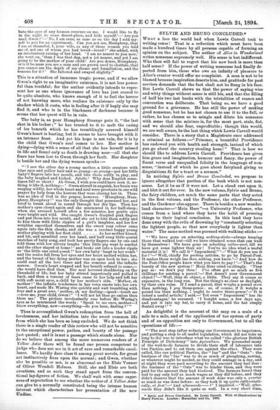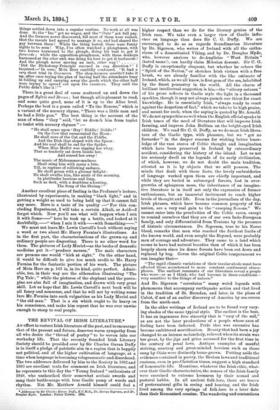SYLVIE AND BRUNO CONCLUDED.*
WHAT a loss the world had when Lewis Carroll took to writing sense ! That is a reflection which must have been made a hundred times by all persons capable of forming an opinion on the subject. The author of Alice in Wonderland
writes nonsense supremely well. His sense is but indifferent. Who then will fail to regret that his new book is more than half sense? If the power of writing nonsense had finally de• parted from him, those who owe an infinity of pleasure to Alice's creator would offer no complaint. A. man is not to be blamed because inspiration deserts him, and gratitude for past services demands that the fact shall not be flung in his face. But Lewis Carroll shows us that the power of saying wise and witty things without sense is still his, and that the filling of half his two last books with the trivialities of reason and convention was deliberate. That being so, we have a good ground for a grievance. He has still the power of making good nonsense, but he has not chosen to use it to the full, or rather, he has chosen so to mingle and dilute his nonsense with sense that the mixture is, for the most part, stale, flat, and we should also fear, unprofitable; though this would, we are well aware, be the last thing which Lewis Carroll would consider. There is a story that a Magistrate once addressed a criminal as follows:—" Prisoner, a bountiful Providence has endowed you with health and strength, instead of which you go about the country stealing hens ! " That is how we should like to address Lewis Carroll. Providence has given
him grace and imagination, humour and fancy, the power of fluent verse and unequalled felicity in the language of non- sense, "instead of which he goes about fairyland giving us
disquisitions fit for a tract or a sermon."
In noticing SyZvie and Bruno Concluded, we propose to
ignore altogether that portion of the book which is not non- sense. Let it be as if it were not. Let a cloud rest upon it, and blot it out for ever. In the new volume, Sylvie and Bruno, the fairy children, act much the same parts that they acted in the first volume, and the Professor, the other Professor, and the Gardener also appear. There is besides a new wonder- land character—" Mein Herr "—a University Professor, who comes from a land where they have the habit of pressing things to their logical conclusion. In this land they have done away with the evils of drowning by "constantly selecting the lightest people, so that now everybody is lighter than water." The same method was pursued with walking-sticks :—
" 'We have gone on selecting walking-sticks—always keeping those that walked best—till we have obtained some that can walk by themselves ! We have gone on selecting cotton-wool, till we have got some lighter than air ! You've no idea what a useful material it is ! We call it " Imponderal." What do you use it for ?'—' Well, chiefly for packing articles, to go by Parcel-Post. It makes them weigh less than nothing, you know.'—' And how do the Post-Office people know what you have to pay?'—' That's the beauty of the new system !' Mein Herr cried exultingly. They pay us : we don't pay them ! I've often got as much as five shillings for sending a parcel.'—' But doesn't your Government object ?'—' Well, they do object, a little. They say it comes so expensive, in the long run. But the thing's as clear as daylight, by their own rules. If I send a parcel, that weighs a pound more than nothing, I pay three-pence : so, of course, if it weighs a pound less than nothing, I ought to receive three-pence.'—' It is indeed a useful article,' I said.= Yet even " Imponderal " has its disadvantages,' he resumed. I bought some, a few days ago, and put it into my hat, to carry it home, and the hat simply floated away !' "
As delightful is the account of the map on a scale of a mile to a mile, and of the application of the system of party and of an opposition not only to Government, but to all the operations of life :-
"' The next step (after reducing our Government to impotence, and putting a stop to all useful legislation, which did not take us long to do) was to introduce what we called "the glorious British Principle of Dichotomy " into Agriculture. We persuaded many of the well-to-do farmers to divide their staff of labourers into two Parties, and to set them one against the other. They were called, like our political Parties, the " Ins" and the "Outs": the business of the "Ins" was to do as much of ploughing, sowing, or whatever might be needed, as they could manage in a day, and at night they were paid according to the amount they had done : the business of the " Outs" was to hinder them, and they were paid for the amount they had hindered. The farmers found they had to pay only half as much wages as they did before, and they didn't observe that the amount of work done was only a quarter as much as was done before : so they took it up quite enthusiasti- cally, at first.'—' And afterwards— P' I inquired.—' Well, after- wards they didn't like it quite so well. In a very short time, • Sylvia and Bruno Concluded. By Lewis Carroll With 46 Mastrations by Harry Funi as. London ; Macmillan and Co. 1893.
things settled down into a regular routine. No work at all was done. So the "Ins" got no wages, and the " Outs " got full pay. And the farmers never discovered, till most of them were ruined, that the rascals had agreed to manage it so, and had shared the pay between them ! While the thing lasted, there were funny sights to be seen ! Why, I've often watched a ploughman, with two horses harnessed to the plough, doing his best to get it forwards ; while the opposition-ploughman, with three donkeys harnessed at the other end, was doing his best to get it backwards ! And the plough never moving an inch, either way!' Did the Dichotomy-Principle succeed in any direction ? ' I inquired. = In none,' Mein Herr candidly confessed. It had a very short trial in Commerce. The shop-keepers wouldn't take it up, after once trying the plan of having half the attendants busy in folding up and carrying away the goods which the other half were trying to spread out upon the counters. They said the Public didn't like it !' "
There is a great deal of verse scattered up and down the pages of Sylvie and Bruno ; but though all is pleasant to read,
and some quite good, none of it is up to the Alice level.
Perhaps the best is a poem called " To the Rescue," which is a variant of the nursery rhyme, " There was a little man and he had a little gun." The best thing is the account of the man of whom " they " said, "let us drench him from toplet to toelet with nursery rhymes "
"He shall muse upon 'Hey! Diddle! Diddle!' On the Cow that surmounted the Moon : He shall rave of the Cat and the Fiddle,
And the Dish that eloped with the Spoon: And his soul shall be sad for the Spider, When Miss Mullet was sipping her whey, That so tenderly sat down beside her, And scared her away !
The music of Midsummer-madness Shall sting him with many a bite.
Till, in rapture of rollicking sadness, He shall groan with a gloomy delight : He shall swathe him, like mists of the morning, In platitudes luscious and limp, Such as deck, with a deathless adorning, The Song of the Shrimp !"
Another excellent piece of fooling is the Professor's lecture, illustrated by experiments, in making "black light," and in getting a weight so used to being held up that it cannot fall any more. Here is a taste of its quality :—" For this con- cluding Experiment, I will take a certain Alkali, or Acid—I forget which. Now you'll see what will happen when I mix it with Some—" here he took up a bottle, and looked at it doubtfully,—" when I mix it with—with Something—." We must not leave Mr. Lewis Carroll's book without saying a word or two about Mr. Harry Furniss's illustrations. As in the first part, the characterisations of the grown-up and ordinary people are disgusting. There is no other word for them. The pictures of Lady Muriel—as the books of domestic medicine put it—" produce nausea." The male characters are persons one would "kick at sight." On the other hand, it would be difficult to give too much credit to Mr. Harry Pansies for the fantastic portion of his work. The picture of Mein Herr on p. 163 is, in its kind, quite perfect. Admir- able, too, in their way are the silhouettes illustrating "The Pig Tale ; " while the pictures of the elephant and the porcu- pine are also fall of imagination, and drawn with very great skill. Let us hope that Mr. Lewis Carroll's next book will be all fancy and nonsense, and that he will not by writing sense lure Mr. Furniss into such vulgarities as his Lady Muriel and " the old man." That is a sin which ought to lie heavy on his conscience, and make him repent that he was ever unwise enough to stoop to real people.



































 Previous page
Previous page